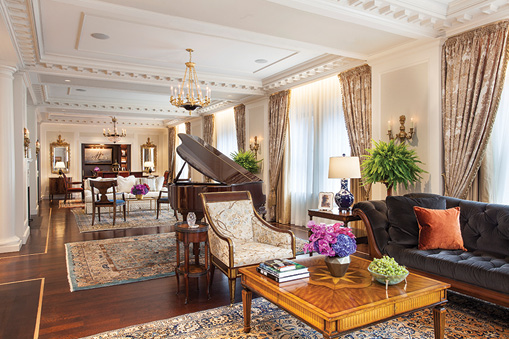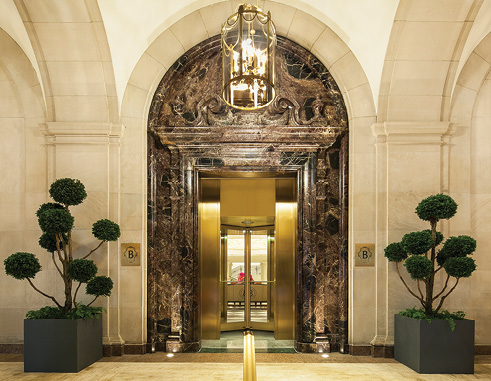- Home
- Media Kit
- Current Issue
- Past Issues
- Ad Specs-Submission
- Ad Print Settings
- Reprints (PDF)
- Photo Specifications (PDF)
- Contact Us


![]()
ONLINE

Sustainable Hospitality
Editors’ Note
Hervé Houdré has held his current post since October 2009. Before this, he was Regional Director of Operations and General Manager for Intercontinental Hotels Group. He received his M.B.A. from RMS.
Property Brief
Since first opening its doors in 1926, the InterContinental New York Barclay (intercontinentalnybarclay.com) has welcomed countless guests to enjoy a luxurious residential-style experience in the heart of the city. Today, the property remains Manhattan’s preeminent luxury hotel after undergoing the most ambitious restoration in its history. Combining sophistication and contemporary design, while staying true to its original Federalist style details, the Barclay exudes confidence and warmth, delivering the same residential feel with modern comfort and flexibility introduced to the world in 1926.

Presidential Suite living area
Following a major transformation, where does the product stand today and has it been well received?
We closed the hotel for 20 months and renovated it for $180 million.
The designers understood that when the Barclay had opened, it had a residential feel that the rich and discreet guests cherished, so they translated this concept very well for today’s guests. We wanted to give the atmosphere of a Park Avenue residential building and it’s what they successfully did. Our customers really feel at ease with the new look, and our loyal guests are happy we kept the atmosphere of the hotel they prefer in New York.
How important was it not to lose the heritage?
The classic atmosphere is part of our DNA. It’s also not our philosophy to take an old building and make it new and hip. We wanted to be fashionable but in a classical way.
There has been a strong emphasis on the suite product. Will you talk about that?
It’s part of our strategy going forward to create signature suites. We have doubled the size of our Presidential Suite and created a 3,000-square-foot Penthouse Suite that boasts a 1,300-square-foot terrace on the roof of the hotel. We wanted them to be at the forefront of our strategy to sell to a new type of clientele, like Middle Eastern families and European royalty, CEOs of the top international companies as well as entertainment and fashion celebrities.
Do you still have the more standard suite configurations?
We opened connections that didn’t exist before to answer to the needs of families from all over the world. Our suites are now all two-bedroom or can be combined with several rooms in the vicinity.

InterContinental New York Barclay birdcage entrance
Will you talk about where your interest in sustainability came from and what that means to the property?
I realized at one point in my life that I could make a difference as a businessperson even though I had previously assumed I never could. I’ve been focused on making profit but in a very responsible way. I have been in sync with our company’s focus on sustainability as well.
How important is it to get people to understand this kind of commitment?
Since we reopened the hotel, we came up with an interesting strategy to use the platform of the 2030 United Nations agenda for Sustainable Development, which has 17 Sustainable Development Goals. Our focus is to fulfill all of those 17 goals through local partnerships with many types of charitable organizations.
Environmentally, we have already done a lot – we have LED lighting, low-flow toilets and showers, digesters that digest our organic food scraps, and we use as little paper as possible and what we use is recycled. We use mostly local, organic, and sustainable produce in our menus. We are serious about all of this, as well as social responsibility.
Is it hard to manage this at a hotel because so much is based on the discretion of guests?
I’ve noticed that individually, guests are not always acting responsibly like when they leave lights or air-conditioning on for no reason. However, corporations are very responsible, and they are asking us in the RFP process to tell them how sustainable we are. IHG has come up with a great internal certification called Green Engage with 180 indicators and the goal is to fulfill all of those. We use that as a basis to obtain other certifications.
I believe that green brings green – a lot of corporations have developed a comprehensive sustainability strategy, and they will choose a hotel that shares their culture.
Do you think that the industry follows suit in this regard?
I do, but I feel it will never be enough. I’m involved at the New York City Hotel Association, NYC & Company, and American Hotel Lodging Association, where I push the sustainability agenda. I’m doing all I can to entice my colleagues and peers to do the same and embrace this endeavor.
Major brands like IHG, Hilton, and Marriott all have a strategy in place. It is, however, much easier for an individual hotel to develop its own strategy within the scope of the brand.
Every company is definitely committed to it. Everyone in our industry realizes we have a responsibility as hotels have an important carbon footprint.
In running a property today, is it still about hospitality or is it more financially driven?
It’s a combination, but I’m not one of these managers who thinks the good old days are over.
I believe that things have evolved. In the 1960s, it was about serving the customer as well as possible. It was about hiring, training, and delivering. In the 1980s, we started to develop marketing strategies and to focus on the top line.
In the 1990s, with the ascent of asset management, the GM became more of a businessperson who had to develop the topline and the bottom line, making sure every square foot of a hotel becomes profitable.
After 2000, not only do we have to be good hoteliers and great asset managers, but we also have to take care of the world and become Citizen Hoteliers.
The hotel General Manager is as good as the investment of his owners. I respect that we have to give a return on investment. We have to decide if it’s quality before profitability, profitability before quality; or we’re trying to find a balance, and that is my goal.
What advice do you give young people coming out of hotel schools, with a desire to quickly become a GM and build a sustainable career?
It’s important to always set a goal. The first decision is, “Do I want to be corporate or in the field?”. One can always switch at one point though.
A GM should be an expert and not a generalist in every field. They have to challenge the directors of different departments, so they must gain the experience. Students should go as far as they can in their studies, and then it’s about working hard in the field.•